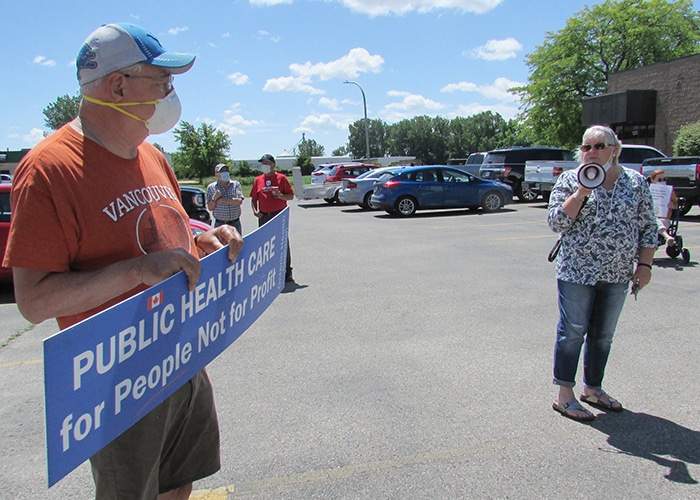
Jenna Cocullo, Local Journalism Initiative
Chatham-Kent residents joined a province-wide day of protest against a bill that would “open the doors to privatization.”
Wednesday afternoon two dozen residents stood outside Chatham-Kent—Leamington MPP Rick Nicholls’ office opposing Bill 175 known as the Connecting People to Home and Community Care Act.
Shirley Roebuck, co-chair of C-K Health Coalition, said the bill fails to address critical care and the staffing crisis.
“We hear of people dying of starvation and dehydration and that can be traced back to poor staffing,” she said.
“The COVID-19 pandemic has exposed the sub-par care our loved ones are paying for. But these things have been happening for years, questionable food and activity, and rationing of supplies like adult diapers.”
Pat Lambier, a dental hygienist who did contract work in long-term care (LTC) homes, said in the 16 years she has worked in LTC she has not seen a change in regards to the amount of staffing for personal support workers (PSWs).
When she treated residents in LTC, she said their oral hygiene was appalling.
“People with broken teeth, metal pieces from their dentures going into their gums, puss coming out of their mouth,” she said. “We should be ashamed of ourselves that we allowed this to happen to our parents.”
Lambier also cited lack of training for PSWs, and lack of PPE equipment like gloves as other major issues in helping LTC residents get proper care.
“And all that is only the teeth. I saw so many horrific things when I worked there. I am so disheartened to find that nothing has changed,” she said. “I am going to go in a home one day and if you think I am going to sit in a bed and not have my teeth brushed for a year you’re crazy.”
READ MORE: C-K private, long-term care was already in crisis: PSW, advocate
CK Public Health officials said they could not comment on the protest regarding Bill 175 as it is specific to Ontario Health. In regard to LTC homes during COVID-19, CK Public Health will be contacting all homes by the end of the week and will be working with them to develop a plan to test staff going forward every two weeks.
Roebuck also said the bill would allow private companies to take on the work in LTC homes that should be done by the non-profit public sector.
Nicholls said there are no provisions in the proposed legislation aimed at privatizing health care or home and community care or which would change the current mix of not-for-profit and for-profit health care providers that currently deliver services to patients within Ontario’s publicly funded health care system.
“Bill 175 is proposing to maintain that health service providers or Ontario Health Teams that provide home and community care services must be not-for-profit. Ontarians can continue to rely on our publicly funded health care system and publicly funded home care” Nicholls said in a statement.
Although the bill does not mention for-profit sectors, NDP health care critic France Gélinas told The Chatham Voice that language which previously protected not-for-profits has been removed in the new bill. Laws that address the oversight of home and community services no longer specify it has to be publicly funded.
“For-profit home care companies will continue to try and gain contracts where they haven’t been able to gain contracts before. Sixty-five to 70 per cent of home care dollars already go to for-profit care providers,” she said. “But they are not there to help seniors, they are there to make money.”
Gélinas said her amendment to add language that included not-for-profits was shot down, as well as an amendment that would add more accountability to the health care system as a whole.
An integrated agency known as Ontario Health is now responsible for primary care, hospital care, rehabilitative care, home and community care, residential long-term care, mental health and addictions. Ontario Health would take over funding from the Local Health Integration Networks (LHIN).
Gélinas said Ontario Health will now make it harder to hold the entire healthcare system accountable. The superagency is governed by a board appointed by the province. She said the majority of members are from for-profit finance industries in Toronto, with one member from North Bay.
“They meet behind closed doors and nobody is allowed to attend, not even me,” she said.
As healthcare critic, Gélinas said that previously she would be allowed access to agendas, minutes and freedom of information requests.
“A whole lot of responsibility that used to be with the Minister is now transferred with no accountability or transparency behind closed doors,” she said.
Protesters of Bill 175 said it was rushed through first and second reading in the Legislature with little time for affected parties to understand its implications.
The bill has not been debated in a third reading yet.
Gélinas and the Chatham-Kent protesters said they hope enough people will speak up to at least make sure the bill does not see a third reading until after the pandemic is over or until lessons are learned from the pandemic.
“I bet what we learn will not support further privatization,” Gélinas said.






